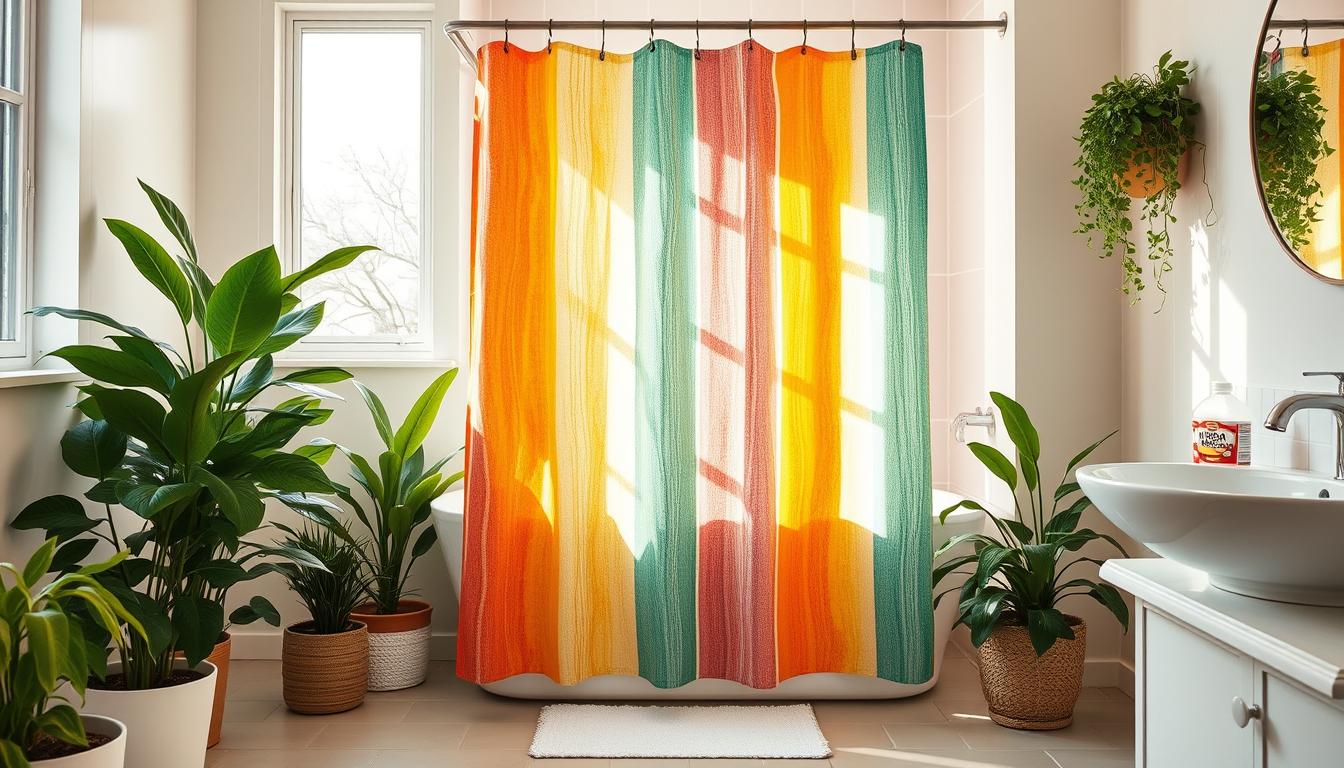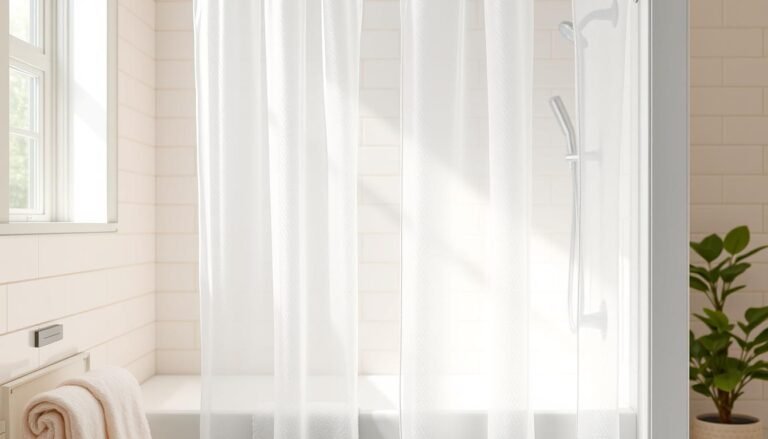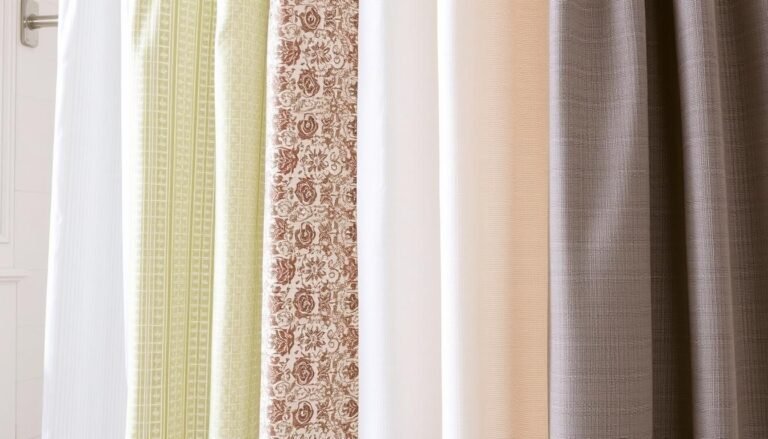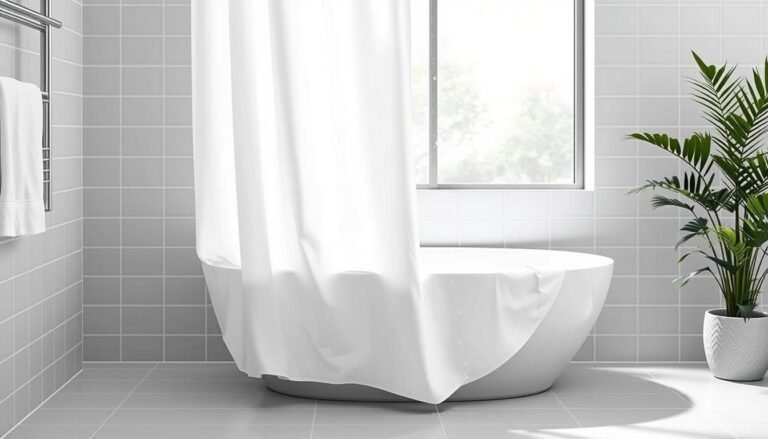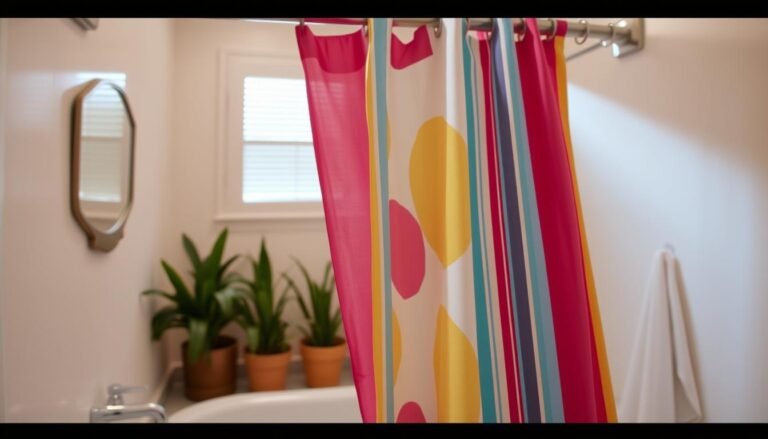Eco-Friendly Cleaning: Shower Curtain Care
Shower curtains play a big role in keeping your bathroom fresh. They face daily moisture and need good care. Following eco-friendly cleaning ways helps the environment and your home stay healthy. Clean fabric curtains every three months and plastic liners once a month to stop mold and bacteria.
For washing fabric curtains, use cold water and gentle soap, like Le Blanc Linen Wash. Plastic liners are better washed by hand with natural cleaners. Always spread the curtain out to dry after using it. Turning on the bathroom fan lowers moisture too. This keeps mold away.
Having more than one shower curtain for each bathroom is smart. It lets you switch them out, keeping things fresh. You can also change your bathroom’s look with the seasons. For extra bathroom cleaning tips, click here.
Using natural cleaning solutions is key for caring for your shower curtain. It keeps things clean and is better for the planet.
Why Choose Eco-Friendly Shower Curtain Cleaning?
Choosing non-toxic methods to clean your shower curtain is good for both your health and the planet. Many cleaners you find in stores are full of harsh chemicals. They can be dangerous and harm the environment. Opting for natural cleaners reduces this negative impact.
Vinegar, baking soda, and lemon are great for eco-friendly cleaning. These options are safer and come in green packaging, reducing plastic waste. Surprisingly, only 7% of cleaning products use vinegar, showing we often overlook its power.
Most people find it easier to clean shower curtains by taking them down. Yet, 18% use bleach in washing machines for a deep clean. This can leave residue and wastes water. Using friendly cleaners keeps your space safe and clean.
By choosing green cleaning, you support a healthier planet. You ensure your bathroom is clean without harming the environment. Let’s look at how natural and traditional cleaners compare:
| Cleaning Method | Benefits | Challenges |
|---|---|---|
| Natural Cleaners (Vinegar, Baking Soda, Lemon) |
|
|
| Traditional Cleaners (Bleach, Ammonia-based) |
|
|
Using natural, non-toxic ingredients for your bathroom keeps your home and the planet healthier. This choice reflects an eco-friendly lifestyle that benefits everyone and helps the environment too.
Supplies Needed for Natural Shower Curtain Cleaning Methods
Using natural cleaning methods for shower curtains keeps your bathroom healthy and supports a green lifestyle. You will need a few basic items to start.
Baking Soda and Vinegar
Baking soda and vinegar can deeply clean your shower curtain. Baking soda works well against mildew and soap build-up. Apply it with a moist cloth or sponge. Then, use vinegar to rinse. It removes bad smells and any left-over dirt.
This powerful mix includes:
- 1/2 cup baking soda
- 1/2 cup distilled white vinegar
To clean, first scrub the curtain with baking soda. After that, rinse it using diluted vinegar. Your shower curtain will look new.
Lemons and Essential Oils
Lemons and essential oils make great cleaning aids too. Lemon juice fights mold and mildew. Essential oils like tea tree provide an extra germ-fighting boost.
Make a cleaning solution with:
- Juice of 2 lemons
- 10 drops of essential oil (like lavender or tea tree oil)
Spray it on the curtain and wait a few minutes before you scrub and rinse. This leaves your curtain clean and smelling fresh, without using harsh chemicals.
Recycled Cleaning Tools
You don’t have to buy new cleaning tools. Old towels, sponges, and toothbrushes can be reused for eco-friendly cleaning. They’re great for hard-to-reach areas and scrubbing off dirt.
To recycle items for cleaning, you can use:
- Old towels for wiping surfaces
- Used toothbrushes for detailed scrubbing
- Recycled spray bottles for your mixes
Choosing these sustainable options helps your wallet and the planet. It cuts down on waste and keeps your home clean.
How to Clean Shower Curtain Without Bleach
Cleaning your shower curtain without bleach is smart and kind to the earth. You can mix one part vinegar with four parts water. This mixture works well against dirt and mildew, minus bleach’s rough side.
Some people use a mix of baking soda and vinegar for extra strength. Add ½ cup of baking soda in the wash cycle. Then, add ¼ cup of vinegar in the rinse cycle. This method is great for fighting mildew. For plastic curtains, wash them with cold water and towels to avoid wrinkles. This is also seen as an earth-friendly cleaning method.
Hand washing is great for plastic curtains. Mix warm water, ¼ cup of baking soda, and some mild soap. You can soak and scrub them gently with this mix. It cleans well and is good for the planet.
Keeping your shower curtain clean regularly is important. A quick weekly clean with vinegar and water spray works wonders. It keeps away soap scum and makes your bathroom healthier.
In damp areas, mold and mildew can grow on shower curtains. To stop this, wipe down the rings and rods when not installed. If you want a deeper clean, use a homemade cleaner. Mix two parts hydrogen peroxide with one part water for mold stains. You can find more on this cleaner here.
Choosing natural methods over bleach keeps your shower curtain looking good for longer. It also makes your home more eco-friendly. Learning how to clean without bleach is safe for your family and the earth.
Step-by-Step Guide to Eco-Friendly Curtain Washing
Keeping your bathroom fresh and clean is key. Using eco-friendly methods to wash your curtains is important. These methods can fight bacteria and mold in damp places. This routine helps your curtains last longer and keeps your bathroom hygienic.
Preparing Your Shower Curtain for Cleaning
Start by taking down your shower curtain. Most curtains can be machine washed, but it’s smart to check the label first. This ensures you follow the right care steps.
Machine Washing Natural Fabrics
For curtains made of natural fabrics, use a gentle cycle with warm water. Add a cup of white vinegar to tackle soap scum and mildew. After washing, hang the curtain to dry. You can also use wool dryer balls with essential oil for quicker drying.
Hand Washing Plastic Liners
Plastic liners need a different care method. Mix warm water and natural detergent in a bucket. Then, gently clean the liner and rinse it well. Hang it up to drip dry. This helps avoid any damage.
Quick Spot Cleaning with Vinegar
For fast cleanups, vinegar is great. Mix white vinegar and water in equal parts in a spray bottle. Spray it directly on spots. Always rinse well to remove any vinegar scent. Doing this often helps keep mold and mildew away. It makes your bathroom stay cleaner.
Homemade Shower Curtain Cleaner Recipes
Keeping your shower curtain clean makes your bathroom more hygienic. Homemade cleaners are cheap and good for the Earth. Here are two simple recipes with natural ingredients. They keep your shower curtain fresh and free of mold.
Lemon and Baking Soda Solution
Making a cleaner with lemon and baking soda is effective and gentle. Mix half a cup of baking soda with lemon juice to make a paste. Apply it on stains or mold on your curtain. Lemon’s acidity and baking soda’s roughness work great against soap scum and mildew. Rinse it off with warm water for a clean surface.
Herbal Vinegar Spray
Another great cleaner is an herbal vinegar spray. Mix one cup of white vinegar with two cups of water. Add about 20 drops of essential oils like lavender or tea tree for their germ-fighting properties. Put it in a spray bottle and shake well. Spray it on your shower curtain and wait 15 minutes before rinsing. This cleaner stops mold and mildew from growing.
- Mix baking soda with lemon juice to make a paste.
- Put the paste on curtain stains.
- Let it sit for 5 to 10 minutes, then scrub and rinse.
- For the vinegar spray, mix vinegar, water, and oils in a bottle.
- Spray it on the curtain, wait 15 minutes, then rinse off.
| Cleaning Solution | Ingredients | Action |
|---|---|---|
| Lemon and Baking Soda Solution | Lemon juice, baking soda | Removes stains and mold, fresh fragrance |
| Herbal Vinegar Spray | White vinegar, water, essential oils | Prevents mold and mildew, antimicrobial |
Benefits of Using Non-Toxic Shower Curtain Cleaning Solutions
Choosing non-toxic shower curtain cleaners is hugely beneficial. They cut down on phthalates, which harm hormones and reproduction. Going non-toxic reduces the health risks linked to these chemicals.
Non-toxic cleaners also improve your air by decreasing volatile organic compounds (VOCs). Options like PEVA or EVA curtains don’t release harmful toxins, improving air quality. This choice is eco-friendly, too, since these materials are sustainable.
Eco-friendly cleaning lowers your carbon footprint. PEVA and EVA are better for the planet than PVC because they’re less toxic. For those wanting to go greener, organic cotton or hemp curtains dyed with non-toxic colors are great.
Another big plus is reducing mold and mildew, especially in damp bathrooms. Natural cleaners tackle these issues without harsh chemicals. Sunlight can also stop bacteria from growing on curtains.
Overall, using non-toxic cleaners protects your health and helps the planet. By choosing these solutions, you keep your family safe and contribute positively to environmental health.
| Material | Non-Toxic | Eco-Friendly | Health Impact |
|---|---|---|---|
| PEVA | Yes | Yes | Low Toxicity |
| EVA | Yes | Yes | Zero Phthalates |
| PVC | No | No | High Toxicity |
| Organic Cotton | Yes | Yes | Non-Toxic Dyes |
| Hemp | Yes | Yes | Non-Toxic Dyes |
Maintaining a Mold-Free Shower Curtain
It’s key to keep your shower curtain mold-free for a clean bathroom. Adopt a monthly clean-up, dry well, and use ventilation to stop mold. This cuts down allergy risks and breathing problems.
Monthly Cleaning Routine
Dr. Paul Pottinger suggests washing your shower curtain every three months. This prevents mold. Lauren Bowen recommends gentle detergent and warm water for cloth curtains. Use the washing machine on a soft setting with plenty of water to avoid damage. For plastic, wash by hand with mild soap to keep it clean without harm.
Proper Drying Techniques
Drying your shower curtain fully after each use stops mold. Spread it out to air well. Use a fan to lower humidity, which mold loves. This keeps your curtain in good shape and mold-free.
Using a Ventilation System
Bad ventilation means moisture hangs around in bathrooms, attracting mold like Cladosporium, Aspergillus, and Penicillium. A good ventilation system cuts this risk. Use an exhaust fan to pull out moist air. This means a cleaner bathroom and no mold sneezing or rashes.
Check our full guide on keeping your bathroom mold-free and clean here.

Hey there, I’m Alex Hanson and I’m passionate about all things covers! Whether you’re looking for a car seat cover to protect your vehicle or an oven cover to keep your kitchen clean, I’m here to help. With years of experience in the industry, I have plenty of knowledge and insights to share with my readers. So, if you care about protecting your belongings and making them look their best, you’re encouraged to read my blog as I explore the perfect cover for every need.

